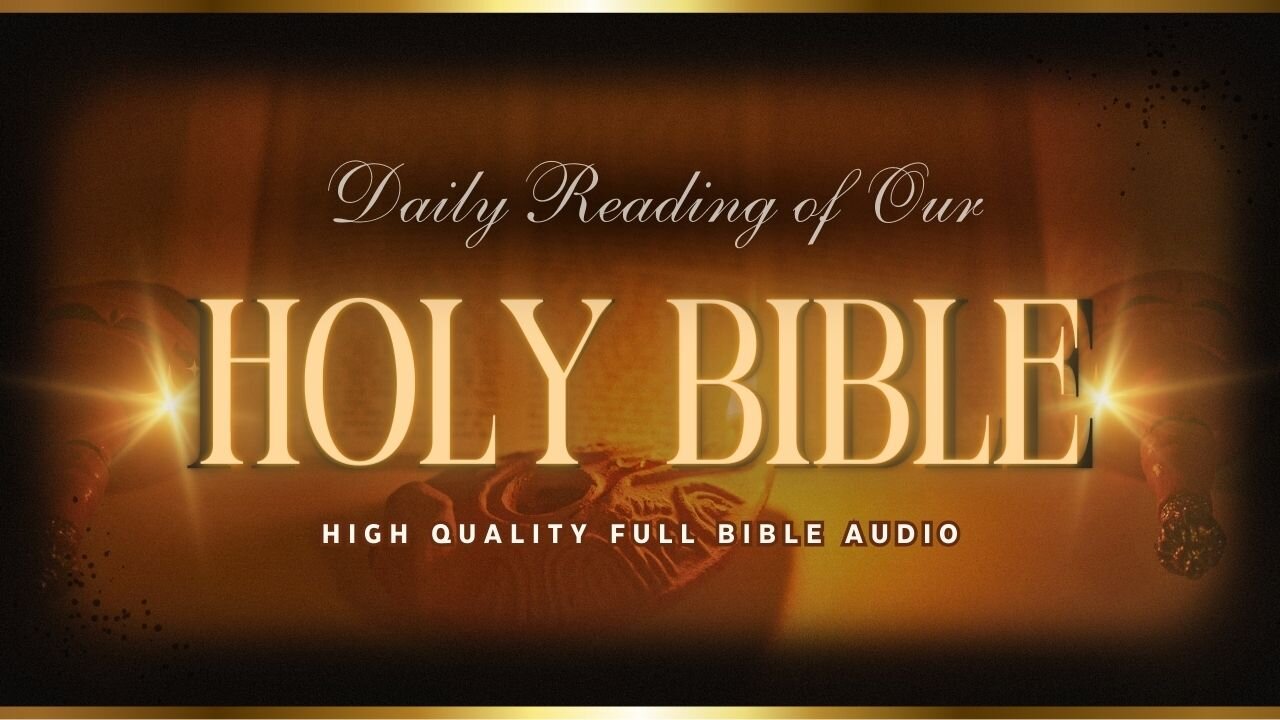Premium Only Content

Job 34 Psalm 26:1-7 Proverbs 27:8 Matthew 13:24-52 Mark 4:26-34
Elihu continues to speak, addressing Job and his friends. He asserts that God is just and does not act wickedly. Elihu accuses Job of speaking without knowledge and suggests that God repays people according to their deeds. He emphasizes that God is omniscient and governs justly, punishing the wicked and protecting the righteous. Elihu argues that God's ways are beyond human understanding and that Job should submit to God's wisdom and justice.
Psalm 26:1-7
Vindicate me, Lord, for I have led a blameless life; I have trusted in the Lord and have not faltered. Test me, Lord, and try me, examine my heart and my mind; for I have always been mindful of Your unfailing love and have lived in reliance on Your faithfulness. I do not sit with the deceitful, nor do I associate with hypocrites. I abhor the assembly of evildoers and refuse to sit with the wicked. I wash my hands in innocence and go about Your altar, Lord, proclaiming aloud Your praise and telling of all Your wonderful deeds.
Proverbs 27:8
Like a bird that flees its nest is anyone who flees from home.
Matthew 13:24-52
The Parable of the Weeds (Matthew 13:24-30)
Jesus tells a parable about a man who sowed good seed in his field, but while everyone was sleeping, an enemy came and sowed weeds among the wheat. When the wheat sprouted, the weeds also appeared. The servants asked if they should pull up the weeds, but the owner instructed them to let both grow until the harvest, when the weeds would be collected and burned, and the wheat gathered into the barn.
The Parables of the Mustard Seed and the Yeast (Matthew 13:31-33)
Jesus compares the kingdom of heaven to a mustard seed, which is the smallest of all seeds but grows into the largest of garden plants, and to yeast that a woman mixed into flour until it worked all through the dough.
The Parable of the Weeds Explained (Matthew 13:36-43)
Jesus explains the parable of the weeds to His disciples. The one who sowed the good seed is the Son of Man, the field is the world, and the good seed represents the people of the kingdom. The weeds are the people of the evil one, and the enemy who sows them is the devil. The harvest is the end of the age, and the harvesters are angels. The weeds will be gathered and burned in the fire, while the righteous will shine like the sun in the kingdom of their Father.
The Parables of the Hidden Treasure and the Pearl (Matthew 13:44-46)
Jesus compares the kingdom of heaven to treasure hidden in a field, which a man found and hid again, and then sold everything he had to buy that field. He also compares it to a merchant looking for fine pearls, who found one of great value and sold everything to buy it.
The Parable of the Net (Matthew 13:47-50)
Jesus compares the kingdom of heaven to a net that was let down into the lake and caught all kinds of fish. When it was full, the fishermen pulled it up on the shore, collected the good fish in baskets, and threw the bad away. This parable illustrates the end of the age, when angels will separate the wicked from the righteous.
Treasures New and Old (Matthew 13:51-52)
Jesus asks His disciples if they have understood all these things. They reply, "Yes." He tells them that every teacher of the law who has become a disciple in the kingdom of heaven is like the owner of a house who brings out of his storeroom new treasures as well as old.
Mark 4:26-34
The Parable of the Growing Seed (Mark 4:26-29)
Jesus tells a parable about the kingdom of God being like a man who scatters seed on the ground. Night and day, whether he sleeps or gets up, the seed sprouts and grows, though he does not know how. All by itself, the soil produces grain—first the stalk, then the head, then the full kernel in the head. As soon as the grain is ripe, he puts the sickle to it, because the harvest has come.
The Parable of the Mustard Seed (Mark 4:30-32)
Jesus compares the kingdom of God to a mustard seed, which is the smallest of all seeds on earth. When planted, it grows and becomes the largest of all garden plants, with such big branches that the birds can perch in its shade.
-
 1:39:43
1:39:43
Brandon Gentile
2 days agoTOP Money Expert: Bitcoin Will Keep Setting All-Time Highs Beyond $10m
12.9K -
 2:02:28
2:02:28
Badlands Media
1 day agoDevolution Power Hour Ep. 385: Trump “Death” Hoax, Supreme Court Tariffs Fight, and Tech-Military Ops
67.1K31 -
 1:56:48
1:56:48
Tundra Tactical
7 hours ago $13.97 earnedFull Semi-Auto Comedy Hour
35.4K2 -
 2:07:31
2:07:31
The Connect: With Johnny Mitchell
17 hours ago $9.41 earnedSecrets Of The Cocaine Cowboys: Miami Drug Lord Reveals Truth About His BILLION-DOLLAR Coke Empire
33.1K2 -
 1:55:52
1:55:52
BlackDiamondGunsandGear
1 day agoGlocks Want Gun Control? // Trump Tramples on your Rights? // After Hours Armory
31.7K4 -
 1:55:52
1:55:52
DLDAfterDark
12 hours ago $5.13 earnedDLD Live! Trump - Flag Burning - Glock & Gun Control - Martial Law Light?? - After Hours Armory
25.8K4 -
 13:46:18
13:46:18
GritsGG
18 hours agoRumble Customs! 3515 Ws! 🫡!
95.1K -
 5:59:47
5:59:47
SpartakusLIVE
14 hours agoThe HUGEST Brain (not forehead) delivers Saturday SPARTOONS || Variety Later - Shadow of Mordor
198K4 -
 2:34:20
2:34:20
Barry Cunningham
15 hours agoPRESIDENT TRUMP WELCOMES FOOTBALL SEASON! AND MORE BREAKING NEWS!
91K56 -
 54:47
54:47
Side Scrollers Podcast
18 hours agoSide Scroller Presents KING OF THE KART | MASSIVE MARIO KART TOURNAMENT
53.1K1